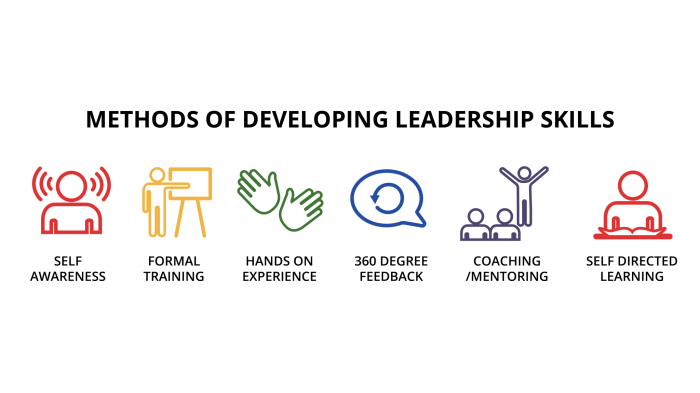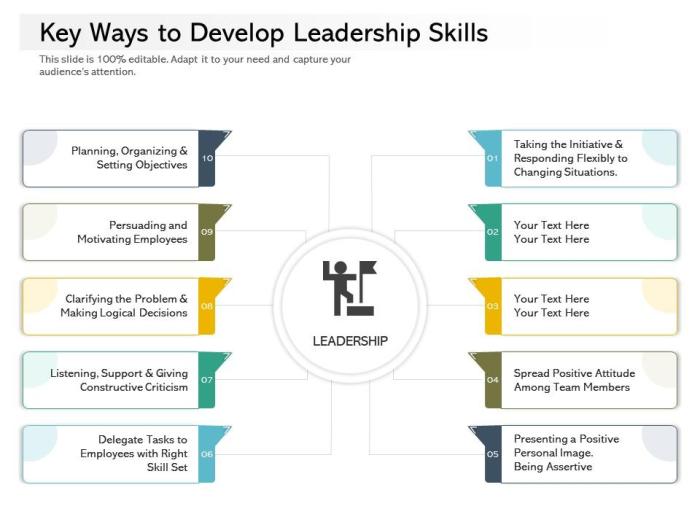Developing Leadership Skills takes center stage, inviting you on a journey through the ins and outs of becoming a great leader. Get ready to dive into the world of leadership like never before!
Whether you’re a natural-born leader or looking to hone your skills, this guide will equip you with the tools and knowledge needed to succeed in any setting.
Understanding Leadership Skills

Leadership skills are the abilities and qualities that enable individuals to guide, direct, and influence others towards a common goal. These skills are crucial for effective teamwork, decision-making, and overall organizational success.Examples of effective leadership skills in action include good communication, problem-solving, decision-making, and the ability to inspire and motivate others. A strong leader can effectively delegate tasks, provide guidance and support to team members, and foster a positive work environment.Leadership skills differ from management skills in that leadership focuses on inspiring and influencing others to achieve a shared vision, while management is more about planning, organizing, and controlling resources to achieve specific goals.Strong leadership skills have a significant impact on team performance and organizational success.
A good leader can boost morale, increase productivity, and foster innovation within a team. They can also help resolve conflicts, build trust among team members, and create a positive and inclusive work culture.
Types of Leadership Styles
Leadership styles play a crucial role in determining how a leader interacts with their team and guides them towards achieving common goals. Let’s explore some of the most common leadership styles and their characteristics.
Autocratic Leadership
Autocratic leaders make decisions independently without consulting their team members. They have full control over the group and tend to give orders without seeking input. While this style can be efficient in certain situations, it may lead to decreased morale and creativity among team members.
Democratic Leadership
Democratic leaders involve team members in the decision-making process and encourage open communication. This style fosters a sense of belonging and empowerment among team members, leading to higher engagement and motivation. However, it can be time-consuming and may not be suitable for quick decision-making.
Transformational Leadership
Transformational leaders inspire and motivate their team members to achieve their full potential. They focus on personal growth, innovation, and long-term goals. This style encourages creativity and fosters a positive work culture. However, it may require a high level of charisma and energy from the leader.
Laissez-Faire Leadership
Laissez-faire leaders provide minimal guidance to their team members, allowing them to make decisions independently. While this style promotes autonomy and creativity, it can lead to confusion and lack of direction if not managed effectively. It is best suited for highly skilled and self-motivated teams.Situational leadership theory suggests that leaders should adapt their style based on the specific circumstances they are facing.
This means that a leader may need to switch between different leadership styles depending on the needs of the team and the goals to be achieved. By being flexible and responsive to changing situations, leaders can effectively guide their team towards success.
Developing Leadership Skills

To become an effective leader, individuals can take specific steps to develop their leadership skills. This process involves enhancing communication skills, understanding emotional intelligence, and fostering collaboration and teamwork.
Enhancing Communication Skills
Effective communication is crucial for successful leadership. Strategies to enhance communication skills include:
- Active listening: Paying attention and responding appropriately to others’ viewpoints.
- Clear and concise messaging: Communicating ideas in a straightforward and understandable manner.
- Empathy: Understanding and considering the feelings and perspectives of others.
- Feedback: Seeking and providing constructive feedback to improve communication effectiveness.
Importance of Emotional Intelligence
Emotional intelligence plays a significant role in effective leadership. Leaders with high emotional intelligence can:
- Manage their emotions: Handling stress and pressure effectively.
- Empathize with others: Understanding and connecting with team members on an emotional level.
- Resolve conflicts: Addressing disagreements and challenges with emotional awareness and sensitivity.
- Inspire and motivate: Encouraging and supporting team members by recognizing their emotions and needs.
Fostering Collaboration and Teamwork Skills
Collaboration and teamwork are essential for achieving common goals. Tips for fostering these skills in leadership development include:
- Building trust: Establishing trust among team members to encourage open communication and collaboration.
- Encouraging diversity: Embracing diverse perspectives and ideas to enhance creativity and innovation within the team.
- Setting clear goals: Defining clear objectives and roles to guide team members towards successful outcomes.
- Recognizing achievements: Acknowledging and celebrating the contributions of team members to promote a positive and supportive team environment.
Leadership Training and Programs
Leadership training and programs play a crucial role in developing essential skills for effective leadership roles in various organizations.
Benefits of Formal Leadership Training Programs
Formal leadership training programs offer structured learning opportunities that can help individuals enhance their leadership abilities and advance their careers.
- Provide specialized knowledge and practical skills.
- Enhance decision-making and problem-solving capabilities.
- Improve communication and interpersonal skills.
- Boost confidence and self-awareness.
Comparison of Different Leadership Development Programs
Organizations may offer various leadership development programs tailored to different levels of leadership and specific industries.
| Program | Focus |
|---|---|
| Executive Leadership Program | Strategic leadership and organizational management. |
| Emerging Leaders Program | Developing leadership skills for early-career professionals. |
| Team Leadership Workshop | Building effective teamwork and collaboration. |
Role of Mentorship and Coaching in Developing Leadership Skills
Mentorship and coaching provide personalized guidance and support for individuals to enhance their leadership skills and navigate challenges in their professional growth.
Mentors and coaches offer valuable feedback, insights, and perspective to help individuals develop their leadership potential.
Experiential Learning Opportunities for Leadership Skill Enhancement
Experiential learning allows individuals to apply leadership concepts in real-world scenarios, gaining practical experience and honing their skills through hands-on activities.
- Internships, projects, and simulations offer opportunities to practice leadership in a controlled environment.
- Networking events and conferences provide exposure to diverse leadership styles and strategies.
